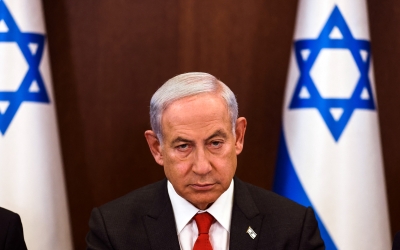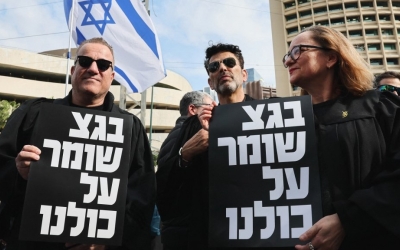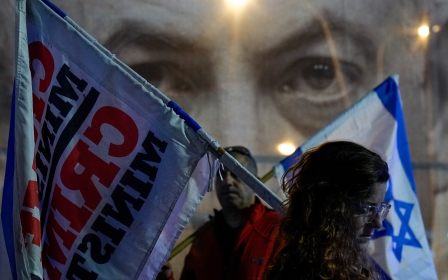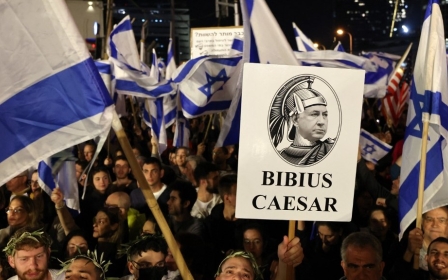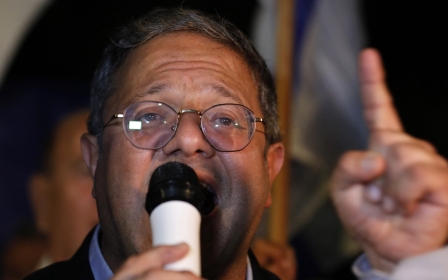Israelis take to streets for fifth week of protests against Netanyahu government

Tens of thousands of Israelis braved heavy rain on Saturday for a fifth week of protests against judicial reform plans by Prime Minister Benjamin Netanyahu's new government that critics say threaten democratic checks on ministers by the courts.
The plans, which the government says are needed to curb overreach by judges, have drawn fierce opposition from groups including lawyers, and raised concerns among business leaders, widening already deep political divisions in Israeli society.
Crowds carrying blue and white Israeli flags marched along Tel Aviv's central Kaplan Street, with signs labelling the new government a "threat to world peace".
Another sign read "Save Israel's democracy from Netanyahu".
"I'm here tonight protesting against the transition of Israel from a democracy to an autocracy," Dov Levenglick, 48, a software engineer told Reuters in Tel Aviv.
"It's a disgrace, it shall not stand."
Netanyahu has dismissed the protests as a refusal by leftist opponents to accept the results of last November's election, which produced one of the most right-wing governments in Israel's history.
The protesters say Israeli democracy would be undermined if the government succeeds in pushing through the plans, which would tighten political control over judicial appointments and limit the Supreme Court's powers to overturn government decisions or Knesset laws.
Local media reported that protests were held in 20 cities across the country, and said tens of thousands gathered in Tel Aviv alone.
Dania Shwartz, 44, from Ramat Gan told AFP that protesters were "reclaiming" the Israeli flag.
"If you look around there's a lot of Israeli flags and for many years the Israeli flag was a symbol of the right (wing)," she said.
"We are patriots and we want this country to keep existing. The Israeli flags belongs to all of us, this is not a question of being right or left."
Shwartz also expressed concern that, as a member of the LGBTQ+ community, "this new government will try to pass laws that will affect my children.
"For example the Noam party wants to delegitimise families like ours and it's very scary," she said, referring to one of Netanyahu's coalition partners known for its virulently anti-gay stance.
Bribery charges
Analysts have warned that the proposed judicial reform programme could potentially allow lawmakers to uphold any annulment of the corruption charges Netanyahu is being tried on.
Netanyahu is the first sitting Israeli prime minister indicted while in office.
He denies the charges against him of bribery, fraud and breach of trust. He took office in late December following his 1 November election win, heading a coalition that includes a politician who last year admitted tax evasion and a clutch of far-right personalities, including one who once kept a portrait in his home of a man who massacred scores of Palestinian worshippers.
Last month, the new national security minister, Itamar Ben-Gvir, ordered the state's police commissioner to enforce a directive to remove Palestinian flags from public spaces a day after one was waved at a previous anti-government protest in Tel Aviv.
"They want to tear up the judiciary system of Israel, they want to tear up Israeli democracy, and we are here every week in every weather… to fight against it and to fight for Israeli democracy," Hadar Segal, 35, told Reuters at Saturday's protest in Tel Aviv.
Opposition leader Yair Lapid joined demonstrations in the coastal city of Haifa on Saturday, where he said protesters "came to save their country, and we came to protest with them."
"We will save our country because we are unwilling to live in an undemocratic country," he added.
Netanyahu returned to power following elections in November, at the head of a coalition with extreme-right and ultra-Orthodox Jewish parties.
Last month, he was forced to remove a top minister, Aryeh Deri, who leads the ultra-Orthodox Shas party, due to a recent tax evasion conviction.
The government has since announced its intention to pursue a policy of settlement expansion in the occupied West Bank, as well the social reforms that have worried the LGBTQ community and controversial judicial reforms.
'Destroy' judicial independence
Last month, almost all the prosecutors and state attorneys that have served in Israel in the previous half-century jointly warned that the planned reforms to the country's justice system would "destroy" judicial independence.
"We call on the government to withdraw the proposed plan and prevent the serious harm to the justice system and the rule of law," they said in the unprecedented letter.
Currently, the governing coalition has three seats in the nine-member committee tasked with appointing judges. The new plan would grant them five, effectively giving the government a clear majority.
The retired officials said that proposed changes to the country's Supreme Court, often the last chance for Israelis and sometimes Palestinians seeking to challenge objectionable policies, would result in a "pseudo-political body that would be suspected of bending the law in favour of the government".
"We were shocked to hear the plan of Justice Minister Yariv Levin for changes in the judicial system. We are convinced that this plan does not herald the improvement of the system but threatens to destroy it," the statement added.
Middle East Eye propose une couverture et une analyse indépendantes et incomparables du Moyen-Orient, de l’Afrique du Nord et d’autres régions du monde. Pour en savoir plus sur la reprise de ce contenu et les frais qui s’appliquent, veuillez remplir ce formulaire [en anglais]. Pour en savoir plus sur MEE, cliquez ici [en anglais].


